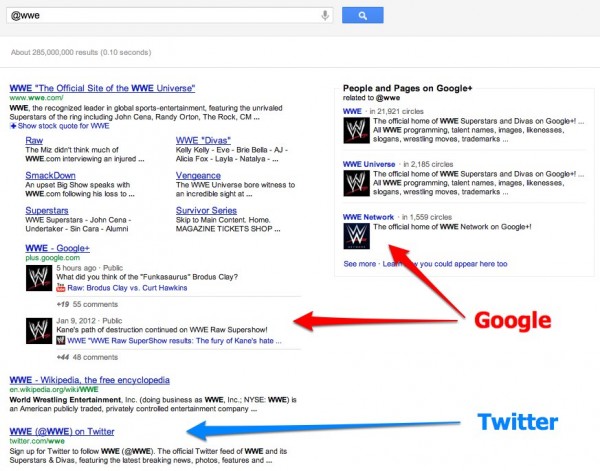Twitter Cries Foul Over Google “@WWE” Search, But Google Still Beats Bing
The war of words continues between Google and Twitter over Google’s new “Search Plus” results that, in part, promote Google+ social accounts. This time, an appropriate example to fight over, the WWE. Let’s get ready to rumble! Twitter’s general counsel, Alex Macgillivray, tweeted about the dispute today: Folks asked for examples. Here’s what a user searching […]
 The war of words continues between Google and Twitter over Google’s new “Search Plus” results that, in part, promote Google+ social accounts. This time, an appropriate example to fight over, the WWE. Let’s get ready to rumble!
The war of words continues between Google and Twitter over Google’s new “Search Plus” results that, in part, promote Google+ social accounts. This time, an appropriate example to fight over, the WWE. Let’s get ready to rumble!
Twitter’s general counsel, Alex Macgillivray, tweeted about the dispute today:
Folks asked for examples. Here’s what a user searching for “@wwe” will be shown on the new @Google.
His example came with a picture of search results on Google. Here’s how they look for @wwe:
The only difference from the picture he tweeted and the one above is that I generated this example directly, when completely logged out of Google. Yes, Google+ suggestions show even if you’re not logged in.
This search was for @wwe, which probably would have been someone looking for the Twitter account of the WWE.
That page isn’t listed first. Instead, it comes third, but a “low” third given how a link to the WWE’s Google+ page gets inserted into the “sitelinks” below the first listing for the official WWE web page.
Off to the side, Google pushes various WWE account on Google+.
Of course, this is still better than at Bing:

Over there, the Twitter page isn’t listed at all in the top results at all. Rather, it appears on the second page of results. The WWE’s Facebook page appears on the first page of result, near the bottom.
With either search engine, showing the Twitter page first given the use of the @ symbol makes sense, good relevancy.
Google certainly can hold its head up that despite all Twitter’s fears about what Search Plus might do, Google is doing a far better job of making the Twitter page visible than Bing does.
But in some ways, things still feel worse than at Bing.
Bing fails because Bing’s relevancy is lame. Google’s relevancy is great here, which is why Twitter makes the first page. But Google spends so much effort adding Google+ everywhere that it almost feels like that visibility — what the searcher is after — gets occluded.
For more about the dispute, as well as how the changes coming live now have a big impact for marketers, see my two stories over at Search Engine Land. The first explains what was coming; the second covers how things are working, as Search Plus goes live for more people:
Postscript: Let me add that when you search at Google for @wwe, Google’s not really searching for @wwe but rather just “wwe.”
Google, to my understanding, ignores the @ symbol. That does make it harder for Twitter pages that might exactly match the keyword entered to rank number one.
For example, if you search for “smx” — the name of our search marketing conference series — I’d expect our SMX site to rank tops on Google. It does.
If you search for @smx, that’s a search for “smx,” so we also come up tops. Same results, right? Our Twitter page comes further down on the first page of results.
At this point, I’d say Google’s long overdue to start matching on the @ symbol. That’s especially so given how Google dropped the + command last year so that it could better support that as a matching symbol for its own Google+ brand pages through Direct Connect.
But the bigger issue to me, as I explained above, isn’t that the Twitter page comes in only third. It’s that so much additional stuff is being done for the Google+ page versus the other social media pages out there.
Related Articles
- Google’s Results Get More Personal With “Search Plus Your World”
- Twitter: Google+ Integration In Google Search Is “Bad” For Everyone
- Schmidt: Google+ Not Favored, Happy To Talk Twitter & Facebook Integration
- Search Engines Should Be Like Santa From “Miracle On 34th Street”
- Real-Life Examples Of How Google’s “Search Plus” Pushes Google+ Over Relevancy
- To Understand Google Favoritism, Think “If Google+ Were YouTube”
Contributing authors are invited to create content for MarTech and are chosen for their expertise and contribution to the search community. Our contributors work under the oversight of the editorial staff and contributions are checked for quality and relevance to our readers. MarTech is owned by Semrush. Contributor was not asked to make any direct or indirect mentions of Semrush. The opinions they express are their own.
Related stories
